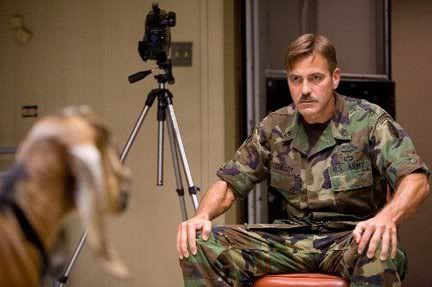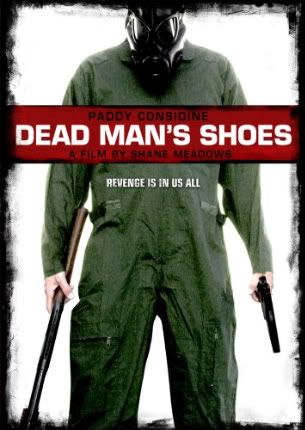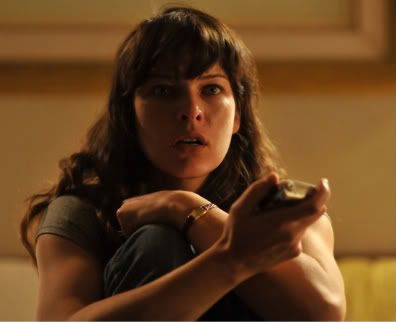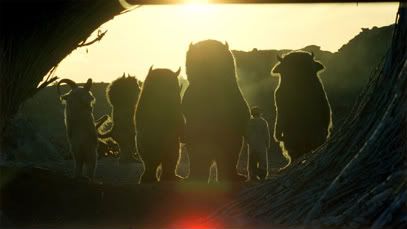
WARNING: SOME MILD SPOILERS AHEAD
I'm sort of enjoying this later-period George Clooney. In both last year's Burn After Reading and the just-released The Men Who Stare At Goats, Clooney seems to be shooting for a subtler, more A-list version of William Shatner, cleverly tweaking his movie-star image and his rugged good lucks for the sake of comic absurdity.
Goats is the sort-of directorial debut of actor/screenwriter/producer Grant Heslov. I say "sort of" because I looked him up on IMDB and saw that he has actually directed a few things before, none of which seem to have gained any real notice. But with Goats (probably because of his Clooney association, with whom he co-wrote Good Night, and Good Luck) he's rocketing out of the gate with a solid pedigree film crammed full of bonafide movie stars (Clooney, Kevin Spacey, Jeff Bridges, Ewan McGregor).
The comedy, based on the book of the same name by journalist Jon Ronson, purports to be the mostly true story of a top-secret group of New Age "supersoldiers" -- led by a Dude-ified Bridges as Bill Django-- formed in the 1970s and trained in the art of psychic warfare. The story revolves around a sadsack journalist named Bob Wilton (McGregor) who somehow manages to convince one of these soldiers, Lyn Cassady (Clooney), to let him tag along with him on a covert mission into Iraq in 2003. Throughout the drive into the desert Cassady tells Wilton all about the history of the "New Earth Army", which is revealed though a series of meandering but basically amusing flashbacks. We're introduced to a motley crew of possibly batshit "psychics" including Django, the naive and hippie-dippy General Hopgood (Stephen Lang), the certifiably nutsoid Gus (Stephen Root), and the sublimely oily Larry Hooper (Spacey). We witness the rise of the New Earth Army and its eventual corruption and demise under Hooper's Machiavellian stewardship. Meanwhile, Wilton and Cassady stumble into a few scrapes -- including getting kidnapped, riding along with a bunch of cowboy Blackwater douchebags (led by Robert Patrick, who seems to be channeling the spirit of George W. Bush), and almost dying of thirst in the desert. All the while, Cassady repeatedly attempts to demonstrate his "superpowers" to the skeptical Wilton, with generally anticlimactic effect.
The movie is pretty amiable, and it has only the barest hint of a narrative to hold it together. Watching it meander toward its conclusion is certainly an amusing and, most of the time, agreeable experience. But there is something slightly discomfiting about the tone. Heslov seems to want to make a biting Three Kings or M.A.S.H.-styled satire, but he doesn't really have the strength of his convictions so he relies largely on slapstick for the comedy. The movie wants so desperately for you to like it that it smiles at you when it should show teeth, caresses when it should cut. The modern-day framing story is set in the early years of the current Iraq War, and the light approach to what should be relatively heavy subject matter (all the psychic nonsense aside) left me feeling a little queasy. A car being blown up by an IED is used for comic effect...and it is funny, until you stop and realize that this shit is still going on right now.
Particularly unpleasant -- in light of the recent massacre at Ft. Hood -- is a scene in which a young New Earth Army recruit, whacked out on LSD, stumbles naked across an Army base and starts shooting. To be fair, Heslov and the studio can't really be blamed for the unfortunate timing, and the scene itself is not meant to be funny. But the relatively quick shift back to farce left a sour taste in my mouth.
Overall, I'd give The Men Who Stared At Goats a mild recommendation. Clooney's performance alone makes it worth the price of admission. He plays Cassady like a slightly crazed and sun-blasted Clark Gable, and manages to hit all the right comic notes without ever quite tipping into caricature. He's able to elicit laughs with a mere twitch of his eyes (I just about peed myself during the "sparkly eyes" moment). The same can't be said for Spacey and Bridges, however. Their performances -- while funny -- are much broader and more conventional.
I really hope Clooney keeps channeling his inner Shatner for many years to come.


